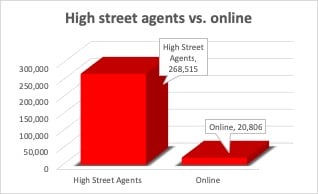Walk down any high street in the UK and you won’t fail to notice an abundance of estate agents. If the media hype over the last few years from online estate agents is to be believed, their days are numbered. In this blog I take a look at the impact online agents are having on the industry and how the most forward-thinking of the traditional agents are embracing technology innovation to future proof their position.
In 2015 online estate agent easyProperty (part of the easyGroup owned by Sir Stelios, the founder of easyJet) staged a three-mile funeral procession paraded through central London, complete with horse, cart and a New Orleans style jazz band and followed by some 40-people dressed up as pin-striped estate agents. The publicity stunt announced their entry into the market and with it, supposedly, the impending “death” of the high street estate agent. At the time, commentators speculated that by 2020 online estate agents could account for 50 per cent of the UK market.

The online agents’ model is characterised by zero commission, low flat fees and a pared-back service. Four years on from the launch of easyProperty, the graveyard for high street estate agents is somewhat lacking in corpses. According to data company TwentyCi, online agents accounted for just 7.2% of new property listings in Q4 2018. Hardly an overwhelming figure. Purplebricks is the most prominent of the online agents. At the beginning of 2018, it had a market cap. of around £1bn but in the six months to 31 October, the company had announced a pre-tax loss of £27.3m and lost nearly three-quarters of value from its start of the year peak. A direct rival to Purplebricks, eMoov, collapsed around the same time.

Over 20,000 households exchanged while listed with an online agent in Q4 2018 providing a market penetration of 7.2%. The percentage is in line with Q3 but down from the high of 7.6% earlier in 2018.
In the short term, at least, the biggest threat for local estate agents is likely to be challenging market conditions, not online disruption. The stalling housing market – weighed down by Brexit uncertainly on top of affordability issues after years of rapidly increasing prices – appears to be putting more pressure on UK estate agents.
“investing in PropTech is the talk of the town”
Whilst “reports of the death [of the local estate agent] have been exaggerated” (to paraphrase Mark Twain), the potential threat from the online agents is causing them to look over their shoulders. The online agents have been a catalyst in causing local agents to investigate ways to modernise their service in what has been a highly traditional market which has not changed for many years.
Investing in PropTech is now the talk of the town. We are now seeing the most forward-thinking high-street agents beginning to take ownership of the direction in which their industry is headed and be proactive about implementing processes that will help them save money, time and improve their service.
Tech innovation to stay ahead
As a nation, we love technology. From our smartphones, we can access everything we need, from wherever we are and at a time that is convenient for us. From ordering a taxi through Uber, to ordering food from Just Eat, online shopping, social networking and watching TV.
Most people browse property portals between the hours of 6-10pm at night and at weekends. So why are we not also able to communicate and transact with local estate agents on-demand? Purplebricks estimates that around 60% of their traffic happens outside of normal office hours. This is a clue as to what the UK property market is looking for: convenience.
With some in the industry recognising that it’s an on-demand service that their clients want these days, a few pioneering estate agents are beginning to embrace the emergence of artificial intelligence and chatbot technology to their offering to cut their administration costs and bring their service into the digital era.
This all makes perfect sense. We are in the age of conversational experience where customers want to be able to message businesses via messaging apps such as Facebook Messenger and WhatsApp just they would their friends and family. It’s beyond chatting; it’s about artificial intelligence, rich media and carousels. In essence, we now all want to conduct business inside the messaging space.
With rapid technology advancements estate agents are able to use intelligent chatbots to take care of the mundane tasks, such as arranging a property valuation, tenant repair reporting or scheduling a viewing, freeing up their staff to focus on higher value activities. It’s about using technology to augment people and help agents consistently deliver better service while reducing operating costs.
According to Gartner, by 2020, customers will manage 85% of their relationship with businesses without interacting with a human. Moreover, 45% of customers do not care whom they interact with, whether it’s a person or a chatbot, as long as the service is effective, accurate and quick. The ‘disruptor’ here is really the customer, and it is imperative that estate agents make their needs a priority.
“It became evident that we should create a digital assistant, a 24h/7 service to be able to fully meet client needs and demands”
One Belfast based estate agents, McGeown’s, decided to hedge their bets and invest in technology, by being the first estate agent in Northern Ireland to launch an intelligent chatbot to deliver 24/7 customer service. “Today, our clients prefer to connect with us digitally rather than over the phone. They browse properties online and they also follow us on Facebook, Twitter, Instagram, etc. Calling us during office hours to schedule a viewing, arrange a valuation or report a repair can be a hassle for them. It became evident that we should create a digital assistant, a 24/7 service to be able to fully meet client needs and demands. Working more efficiently helps us save time, money and improve our customer service” says Danny McGeown, Managing Director of McGeown Estate Agents.

McGeown's new AI Property Chatbot by Syndeo
Despite the many industry predictions to the contrary, the high street estate agent doesn’t seem to be disappearing, but the threat from the new kids on the property block is influencing traditional estate agents to breathe new life into their service. No one really wants to see the complete demise of the traditional estate agent, but we do need to see significant improvement and transformation in the sector. With an increasing focus on PropTech, it’s safe to assume there are further developments to come; how much further online agents will eat into traditional agents’ market share remains to be seen.


Let Us Know What You Thought about this Post.
Put your Comment Below.